Business and Society: Ethical Considerations of Cheap Overseas Labor
VerifiedAdded on 2021/04/21
|5
|1420
|73
Essay
AI Summary
This essay delves into the contentious issue of outsourcing cheap labor, a prevalent practice in the business world, especially in developing countries. It examines the ethical arguments for and against this practice, considering its impact on shareholders, workers, and the overall economy. The essay presents both sides of the argument, exploring the potential benefits of outsourcing, such as increased profits and competitive advantage, while also highlighting the negative consequences, including job losses, exploitation of overseas workers, and potential damage to local economies. The analysis considers various perspectives, including corporate social responsibility, the distribution of wealth, and the impact on tax revenues. The essay concludes by acknowledging the ethical complexities associated with outsourcing and the need for a balanced approach that considers the interests of all stakeholders.
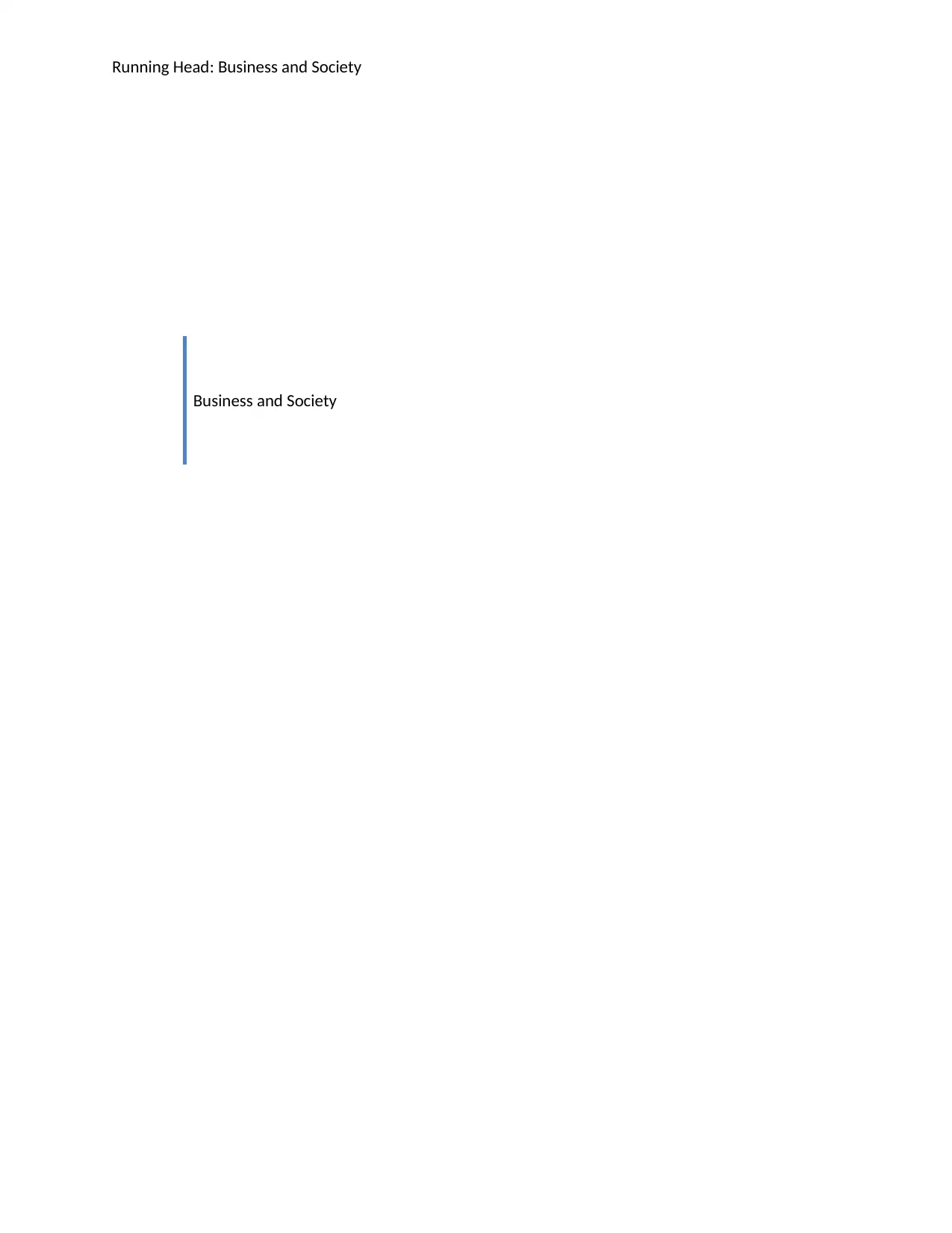
Running Head: Business and Society
Business and Society
Business and Society
Paraphrase This Document
Need a fresh take? Get an instant paraphrase of this document with our AI Paraphraser
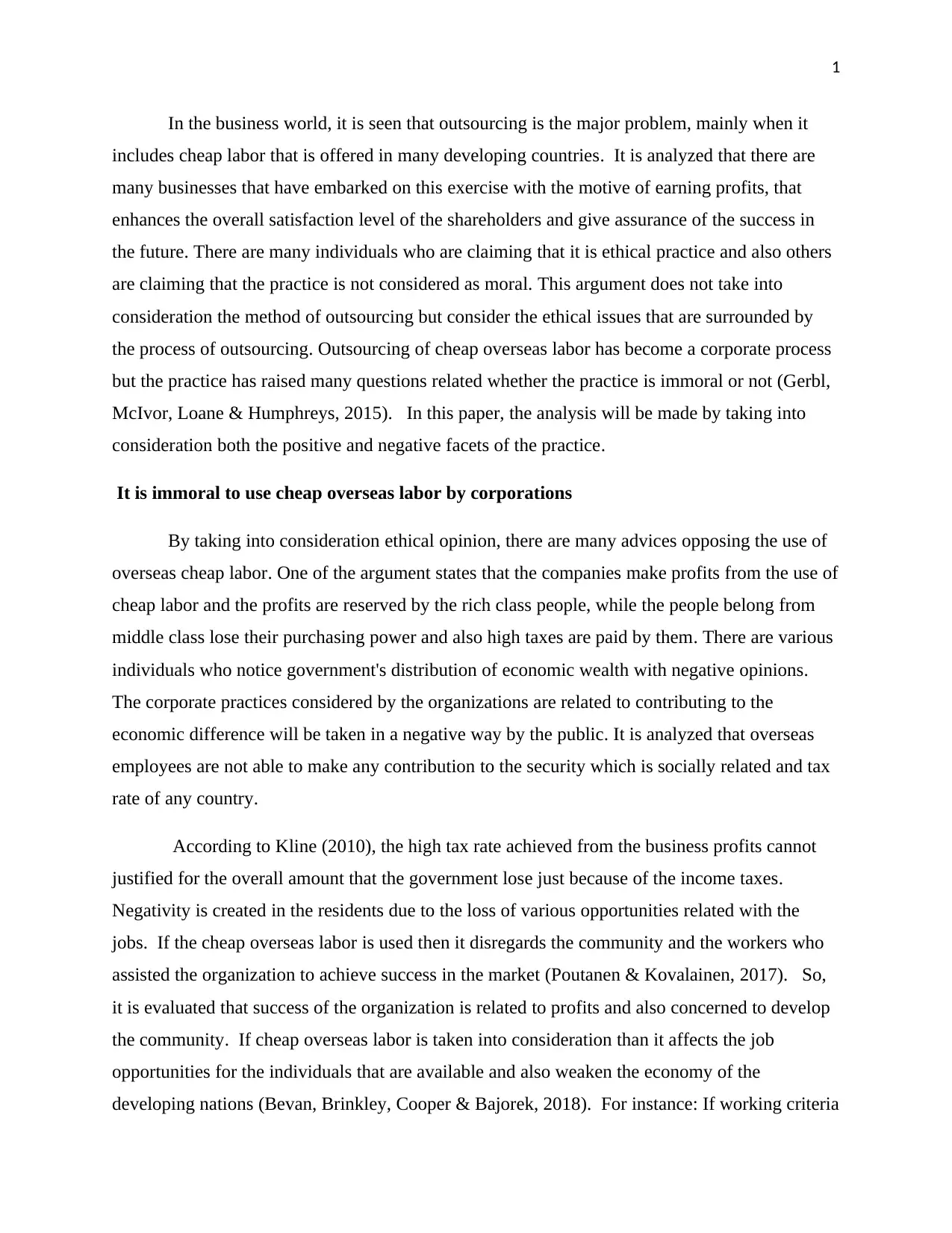
1
In the business world, it is seen that outsourcing is the major problem, mainly when it
includes cheap labor that is offered in many developing countries. It is analyzed that there are
many businesses that have embarked on this exercise with the motive of earning profits, that
enhances the overall satisfaction level of the shareholders and give assurance of the success in
the future. There are many individuals who are claiming that it is ethical practice and also others
are claiming that the practice is not considered as moral. This argument does not take into
consideration the method of outsourcing but consider the ethical issues that are surrounded by
the process of outsourcing. Outsourcing of cheap overseas labor has become a corporate process
but the practice has raised many questions related whether the practice is immoral or not (Gerbl,
McIvor, Loane & Humphreys, 2015). In this paper, the analysis will be made by taking into
consideration both the positive and negative facets of the practice.
It is immoral to use cheap overseas labor by corporations
By taking into consideration ethical opinion, there are many advices opposing the use of
overseas cheap labor. One of the argument states that the companies make profits from the use of
cheap labor and the profits are reserved by the rich class people, while the people belong from
middle class lose their purchasing power and also high taxes are paid by them. There are various
individuals who notice government's distribution of economic wealth with negative opinions.
The corporate practices considered by the organizations are related to contributing to the
economic difference will be taken in a negative way by the public. It is analyzed that overseas
employees are not able to make any contribution to the security which is socially related and tax
rate of any country.
According to Kline (2010), the high tax rate achieved from the business profits cannot
justified for the overall amount that the government lose just because of the income taxes.
Negativity is created in the residents due to the loss of various opportunities related with the
jobs. If the cheap overseas labor is used then it disregards the community and the workers who
assisted the organization to achieve success in the market (Poutanen & Kovalainen, 2017). So,
it is evaluated that success of the organization is related to profits and also concerned to develop
the community. If cheap overseas labor is taken into consideration than it affects the job
opportunities for the individuals that are available and also weaken the economy of the
developing nations (Bevan, Brinkley, Cooper & Bajorek, 2018). For instance: If working criteria
In the business world, it is seen that outsourcing is the major problem, mainly when it
includes cheap labor that is offered in many developing countries. It is analyzed that there are
many businesses that have embarked on this exercise with the motive of earning profits, that
enhances the overall satisfaction level of the shareholders and give assurance of the success in
the future. There are many individuals who are claiming that it is ethical practice and also others
are claiming that the practice is not considered as moral. This argument does not take into
consideration the method of outsourcing but consider the ethical issues that are surrounded by
the process of outsourcing. Outsourcing of cheap overseas labor has become a corporate process
but the practice has raised many questions related whether the practice is immoral or not (Gerbl,
McIvor, Loane & Humphreys, 2015). In this paper, the analysis will be made by taking into
consideration both the positive and negative facets of the practice.
It is immoral to use cheap overseas labor by corporations
By taking into consideration ethical opinion, there are many advices opposing the use of
overseas cheap labor. One of the argument states that the companies make profits from the use of
cheap labor and the profits are reserved by the rich class people, while the people belong from
middle class lose their purchasing power and also high taxes are paid by them. There are various
individuals who notice government's distribution of economic wealth with negative opinions.
The corporate practices considered by the organizations are related to contributing to the
economic difference will be taken in a negative way by the public. It is analyzed that overseas
employees are not able to make any contribution to the security which is socially related and tax
rate of any country.
According to Kline (2010), the high tax rate achieved from the business profits cannot
justified for the overall amount that the government lose just because of the income taxes.
Negativity is created in the residents due to the loss of various opportunities related with the
jobs. If the cheap overseas labor is used then it disregards the community and the workers who
assisted the organization to achieve success in the market (Poutanen & Kovalainen, 2017). So,
it is evaluated that success of the organization is related to profits and also concerned to develop
the community. If cheap overseas labor is taken into consideration than it affects the job
opportunities for the individuals that are available and also weaken the economy of the
developing nations (Bevan, Brinkley, Cooper & Bajorek, 2018). For instance: If working criteria
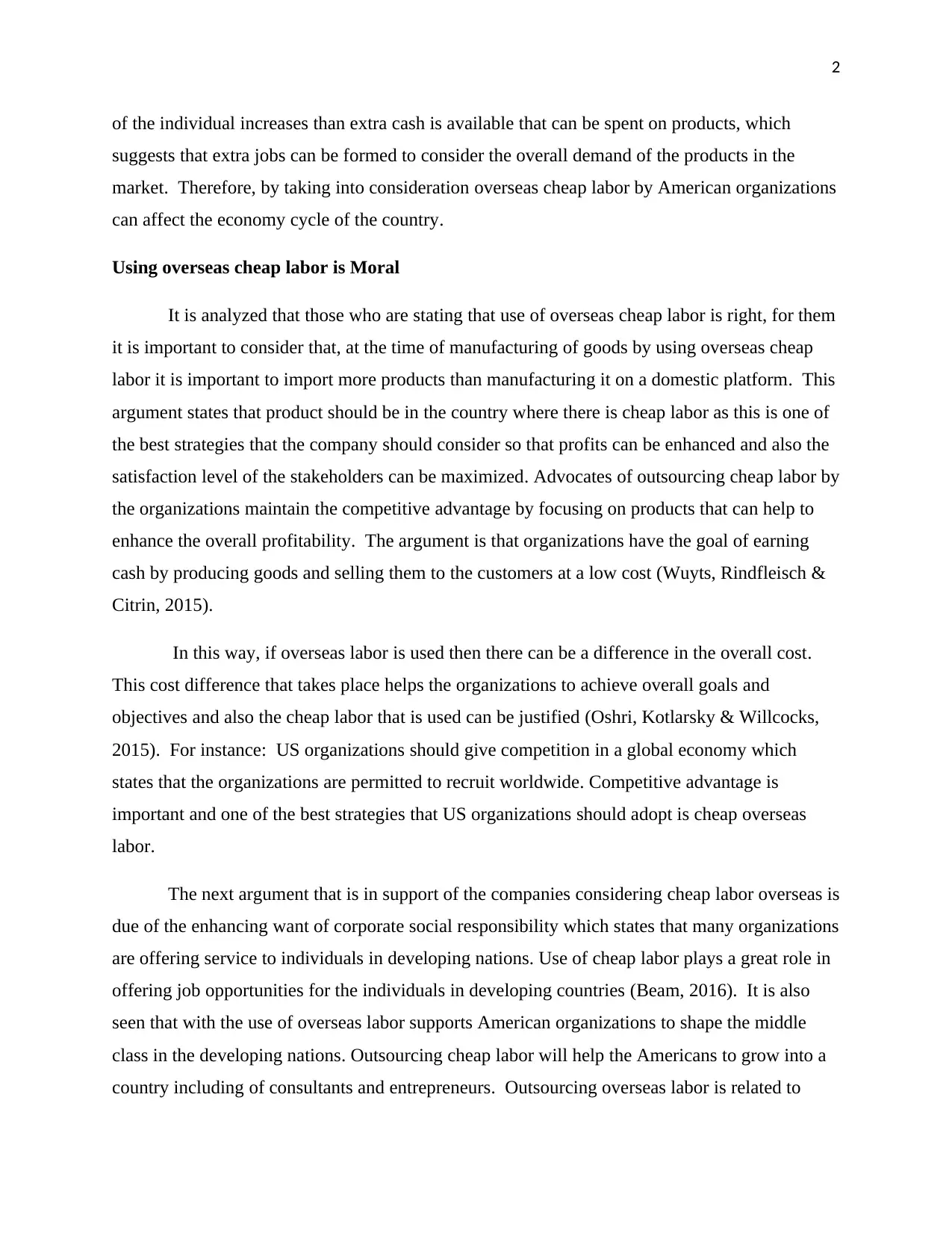
2
of the individual increases than extra cash is available that can be spent on products, which
suggests that extra jobs can be formed to consider the overall demand of the products in the
market. Therefore, by taking into consideration overseas cheap labor by American organizations
can affect the economy cycle of the country.
Using overseas cheap labor is Moral
It is analyzed that those who are stating that use of overseas cheap labor is right, for them
it is important to consider that, at the time of manufacturing of goods by using overseas cheap
labor it is important to import more products than manufacturing it on a domestic platform. This
argument states that product should be in the country where there is cheap labor as this is one of
the best strategies that the company should consider so that profits can be enhanced and also the
satisfaction level of the stakeholders can be maximized. Advocates of outsourcing cheap labor by
the organizations maintain the competitive advantage by focusing on products that can help to
enhance the overall profitability. The argument is that organizations have the goal of earning
cash by producing goods and selling them to the customers at a low cost (Wuyts, Rindfleisch &
Citrin, 2015).
In this way, if overseas labor is used then there can be a difference in the overall cost.
This cost difference that takes place helps the organizations to achieve overall goals and
objectives and also the cheap labor that is used can be justified (Oshri, Kotlarsky & Willcocks,
2015). For instance: US organizations should give competition in a global economy which
states that the organizations are permitted to recruit worldwide. Competitive advantage is
important and one of the best strategies that US organizations should adopt is cheap overseas
labor.
The next argument that is in support of the companies considering cheap labor overseas is
due of the enhancing want of corporate social responsibility which states that many organizations
are offering service to individuals in developing nations. Use of cheap labor plays a great role in
offering job opportunities for the individuals in developing countries (Beam, 2016). It is also
seen that with the use of overseas labor supports American organizations to shape the middle
class in the developing nations. Outsourcing cheap labor will help the Americans to grow into a
country including of consultants and entrepreneurs. Outsourcing overseas labor is related to
of the individual increases than extra cash is available that can be spent on products, which
suggests that extra jobs can be formed to consider the overall demand of the products in the
market. Therefore, by taking into consideration overseas cheap labor by American organizations
can affect the economy cycle of the country.
Using overseas cheap labor is Moral
It is analyzed that those who are stating that use of overseas cheap labor is right, for them
it is important to consider that, at the time of manufacturing of goods by using overseas cheap
labor it is important to import more products than manufacturing it on a domestic platform. This
argument states that product should be in the country where there is cheap labor as this is one of
the best strategies that the company should consider so that profits can be enhanced and also the
satisfaction level of the stakeholders can be maximized. Advocates of outsourcing cheap labor by
the organizations maintain the competitive advantage by focusing on products that can help to
enhance the overall profitability. The argument is that organizations have the goal of earning
cash by producing goods and selling them to the customers at a low cost (Wuyts, Rindfleisch &
Citrin, 2015).
In this way, if overseas labor is used then there can be a difference in the overall cost.
This cost difference that takes place helps the organizations to achieve overall goals and
objectives and also the cheap labor that is used can be justified (Oshri, Kotlarsky & Willcocks,
2015). For instance: US organizations should give competition in a global economy which
states that the organizations are permitted to recruit worldwide. Competitive advantage is
important and one of the best strategies that US organizations should adopt is cheap overseas
labor.
The next argument that is in support of the companies considering cheap labor overseas is
due of the enhancing want of corporate social responsibility which states that many organizations
are offering service to individuals in developing nations. Use of cheap labor plays a great role in
offering job opportunities for the individuals in developing countries (Beam, 2016). It is also
seen that with the use of overseas labor supports American organizations to shape the middle
class in the developing nations. Outsourcing cheap labor will help the Americans to grow into a
country including of consultants and entrepreneurs. Outsourcing overseas labor is related to
⊘ This is a preview!⊘
Do you want full access?
Subscribe today to unlock all pages.

Trusted by 1+ million students worldwide
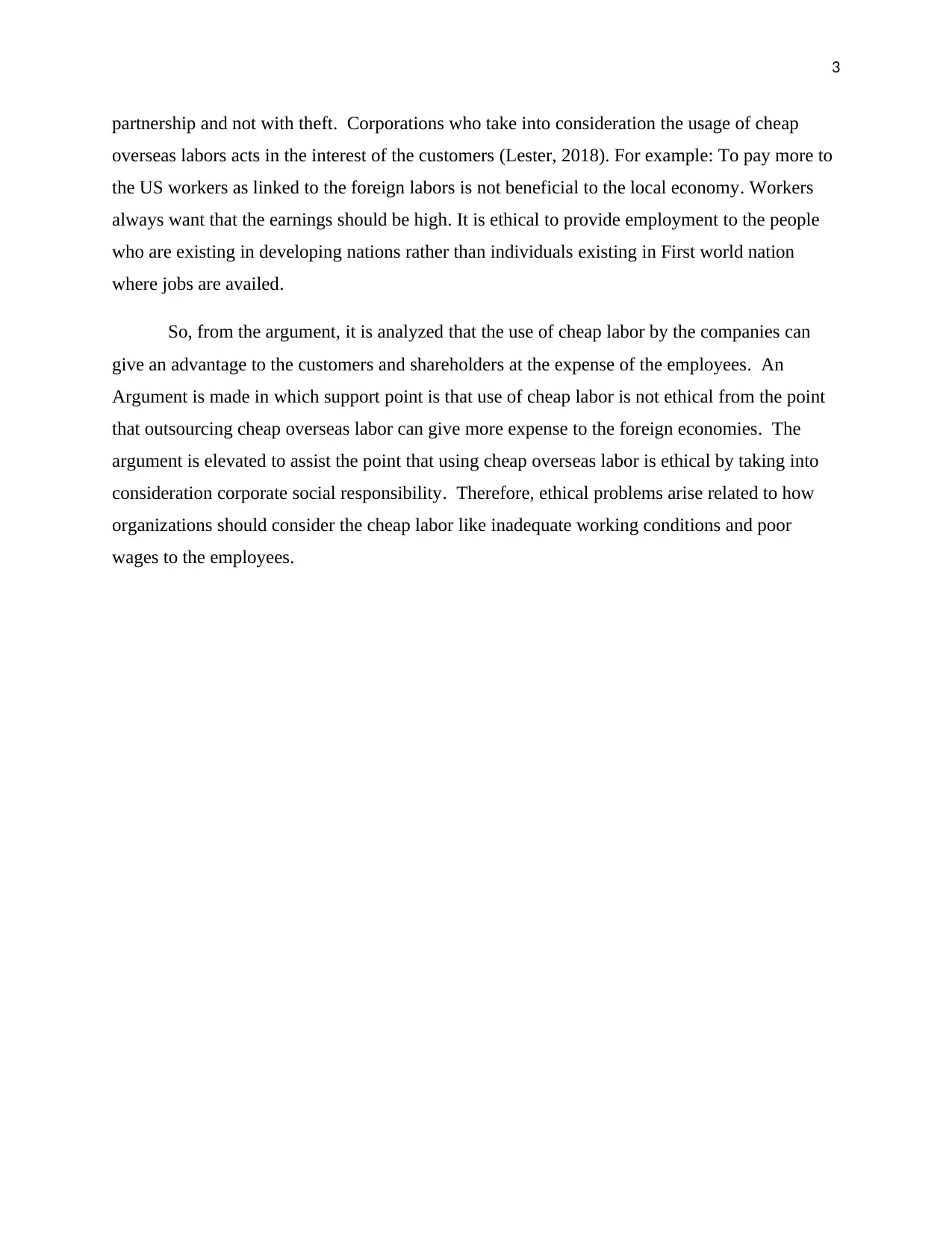
3
partnership and not with theft. Corporations who take into consideration the usage of cheap
overseas labors acts in the interest of the customers (Lester, 2018). For example: To pay more to
the US workers as linked to the foreign labors is not beneficial to the local economy. Workers
always want that the earnings should be high. It is ethical to provide employment to the people
who are existing in developing nations rather than individuals existing in First world nation
where jobs are availed.
So, from the argument, it is analyzed that the use of cheap labor by the companies can
give an advantage to the customers and shareholders at the expense of the employees. An
Argument is made in which support point is that use of cheap labor is not ethical from the point
that outsourcing cheap overseas labor can give more expense to the foreign economies. The
argument is elevated to assist the point that using cheap overseas labor is ethical by taking into
consideration corporate social responsibility. Therefore, ethical problems arise related to how
organizations should consider the cheap labor like inadequate working conditions and poor
wages to the employees.
partnership and not with theft. Corporations who take into consideration the usage of cheap
overseas labors acts in the interest of the customers (Lester, 2018). For example: To pay more to
the US workers as linked to the foreign labors is not beneficial to the local economy. Workers
always want that the earnings should be high. It is ethical to provide employment to the people
who are existing in developing nations rather than individuals existing in First world nation
where jobs are availed.
So, from the argument, it is analyzed that the use of cheap labor by the companies can
give an advantage to the customers and shareholders at the expense of the employees. An
Argument is made in which support point is that use of cheap labor is not ethical from the point
that outsourcing cheap overseas labor can give more expense to the foreign economies. The
argument is elevated to assist the point that using cheap overseas labor is ethical by taking into
consideration corporate social responsibility. Therefore, ethical problems arise related to how
organizations should consider the cheap labor like inadequate working conditions and poor
wages to the employees.
Paraphrase This Document
Need a fresh take? Get an instant paraphrase of this document with our AI Paraphraser
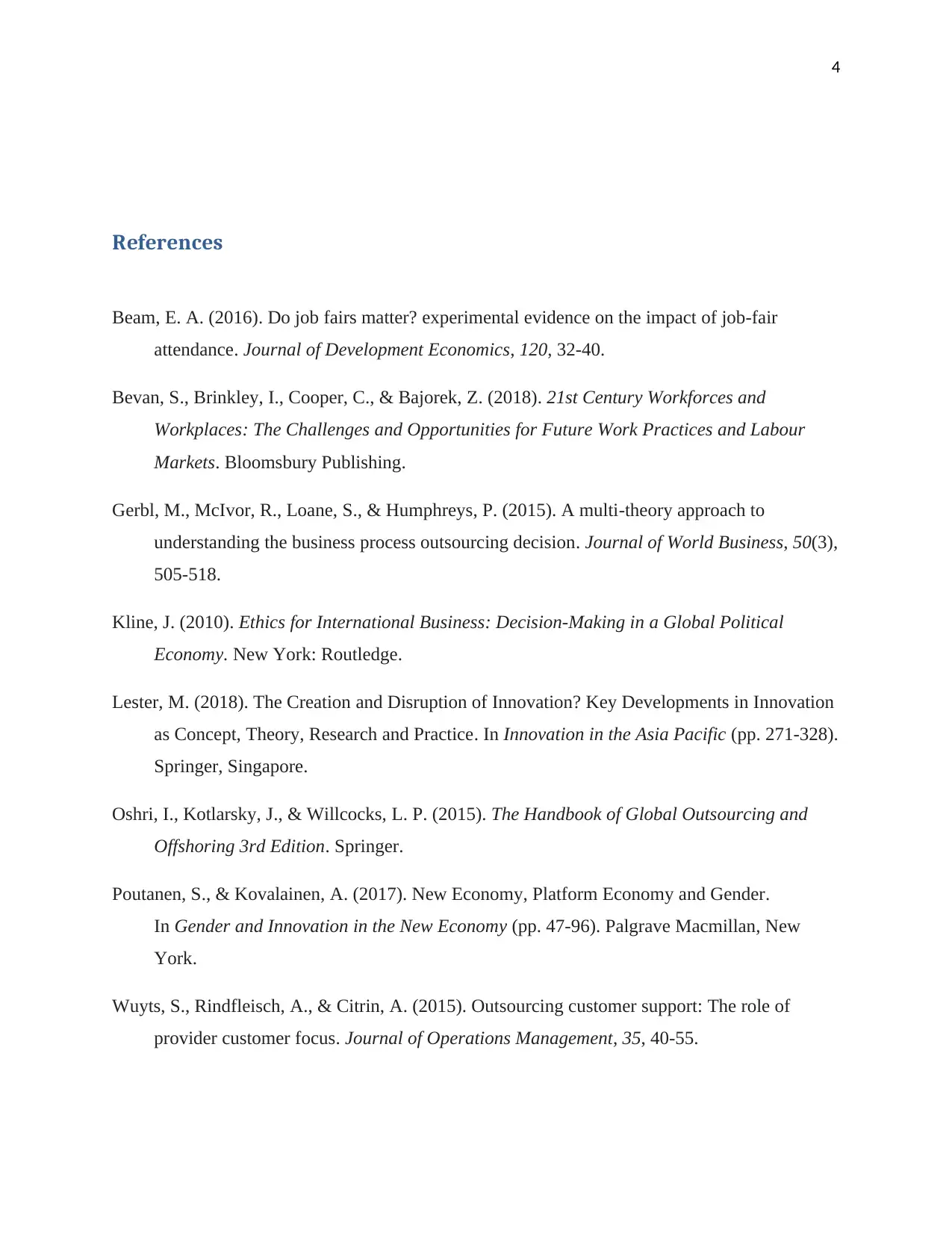
4
References
Beam, E. A. (2016). Do job fairs matter? experimental evidence on the impact of job-fair
attendance. Journal of Development Economics, 120, 32-40.
Bevan, S., Brinkley, I., Cooper, C., & Bajorek, Z. (2018). 21st Century Workforces and
Workplaces: The Challenges and Opportunities for Future Work Practices and Labour
Markets. Bloomsbury Publishing.
Gerbl, M., McIvor, R., Loane, S., & Humphreys, P. (2015). A multi-theory approach to
understanding the business process outsourcing decision. Journal of World Business, 50(3),
505-518.
Kline, J. (2010). Ethics for International Business: Decision-Making in a Global Political
Economy. New York: Routledge.
Lester, M. (2018). The Creation and Disruption of Innovation? Key Developments in Innovation
as Concept, Theory, Research and Practice. In Innovation in the Asia Pacific (pp. 271-328).
Springer, Singapore.
Oshri, I., Kotlarsky, J., & Willcocks, L. P. (2015). The Handbook of Global Outsourcing and
Offshoring 3rd Edition. Springer.
Poutanen, S., & Kovalainen, A. (2017). New Economy, Platform Economy and Gender.
In Gender and Innovation in the New Economy (pp. 47-96). Palgrave Macmillan, New
York.
Wuyts, S., Rindfleisch, A., & Citrin, A. (2015). Outsourcing customer support: The role of
provider customer focus. Journal of Operations Management, 35, 40-55.
References
Beam, E. A. (2016). Do job fairs matter? experimental evidence on the impact of job-fair
attendance. Journal of Development Economics, 120, 32-40.
Bevan, S., Brinkley, I., Cooper, C., & Bajorek, Z. (2018). 21st Century Workforces and
Workplaces: The Challenges and Opportunities for Future Work Practices and Labour
Markets. Bloomsbury Publishing.
Gerbl, M., McIvor, R., Loane, S., & Humphreys, P. (2015). A multi-theory approach to
understanding the business process outsourcing decision. Journal of World Business, 50(3),
505-518.
Kline, J. (2010). Ethics for International Business: Decision-Making in a Global Political
Economy. New York: Routledge.
Lester, M. (2018). The Creation and Disruption of Innovation? Key Developments in Innovation
as Concept, Theory, Research and Practice. In Innovation in the Asia Pacific (pp. 271-328).
Springer, Singapore.
Oshri, I., Kotlarsky, J., & Willcocks, L. P. (2015). The Handbook of Global Outsourcing and
Offshoring 3rd Edition. Springer.
Poutanen, S., & Kovalainen, A. (2017). New Economy, Platform Economy and Gender.
In Gender and Innovation in the New Economy (pp. 47-96). Palgrave Macmillan, New
York.
Wuyts, S., Rindfleisch, A., & Citrin, A. (2015). Outsourcing customer support: The role of
provider customer focus. Journal of Operations Management, 35, 40-55.
1 out of 5
Related Documents
Your All-in-One AI-Powered Toolkit for Academic Success.
+13062052269
info@desklib.com
Available 24*7 on WhatsApp / Email
![[object Object]](/_next/static/media/star-bottom.7253800d.svg)
Unlock your academic potential
Copyright © 2020–2026 A2Z Services. All Rights Reserved. Developed and managed by ZUCOL.





